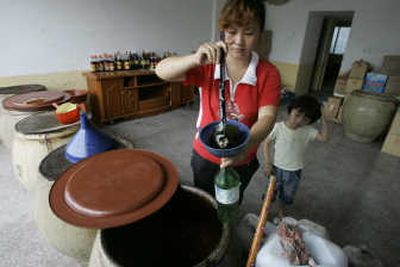China bans chemical in toothpaste

BEIJING – China banned diethylene glycol – a thickening agent in antifreeze – from use in toothpaste Wednesday, one of its most significant concessions yet as it struggles to regain international confidence in the country’s beleaguered exports.
Chinese-made toothpaste containing the toxic substance, which can cause kidney failure, paralysis and death, has been yanked from sale in North and South America, Europe and Asia in recent weeks.
Diethylene glycol is used as a low-cost substitute for glycerin, a sweetener commonly found in drugs, food, toothpaste and other products. Although there have been no reports of health problems stemming from the toothpaste, dozens of people in Panama died last year after taking medicine contaminated with the chemical imported from China. It was passed off as harmless glycerin.
“From today onwards, toothpaste manufacturers are not allowed to use diethylene glycol as an ingredient,” the General Administration of Quality Supervision, Inspection and Quarantine said in a notice posted Wednesday on its Web site.
While China has never had guidelines banning diethylene glycol, or DEG, in toothpaste, the statement said the vast majority of Chinese toothpaste manufacturers have already stopped using it in order to reassure consumers and “to avoid unnecessary losses incurred by exporting manufacturers.”
But, it said, the ban also extends to imported products and reiterated China’s official stance that diethylene glycol in small quantities is safe, based on tests carried out by Chinese health experts in 2000.
“Long-term use of toothpaste containing DEG in amounts less than 15.6 percent will not have a negative health impact on humans,” the administration said. “Currently there’s no evidence to show that the use of DEG in toothpaste directly causes cases of poisoning in people. … Consumers should not be concerned.”
The announcement is the latest in a string of moves by China to clarify murky regulations, tighten enforcement and clean up graft – factors underpinning its poor food safety record – as it fights to prove it is not a danger to the global supply chain.
In recent weeks, importers of Chinese goods, especially the United States, have grown extremely wary as the list of products tainted with deadly toxins and dangerously high levels of chemicals grows daily, from frozen fish to juice to toys.
Also Wednesday, the government ordered small, loosely regulated food producers to clean up their act and announced stricter rules for approving new drugs, a day after the former head of its food and drug agency was executed for accepting bribes in exchange for letting fake medicine into the domestic market.
China’s small-scale food producers have been accused of unsanitary production conditions, using tainted or substandard ingredients and failing to register with authorities. While their products generally are sold only in local areas, their continued existence helps explain why China is facing a food crisis.
In a separate statement on its Web site, the quality watchdog warned that small-scale producers will be shut down unless they renovate their operations to meet hygiene standards.